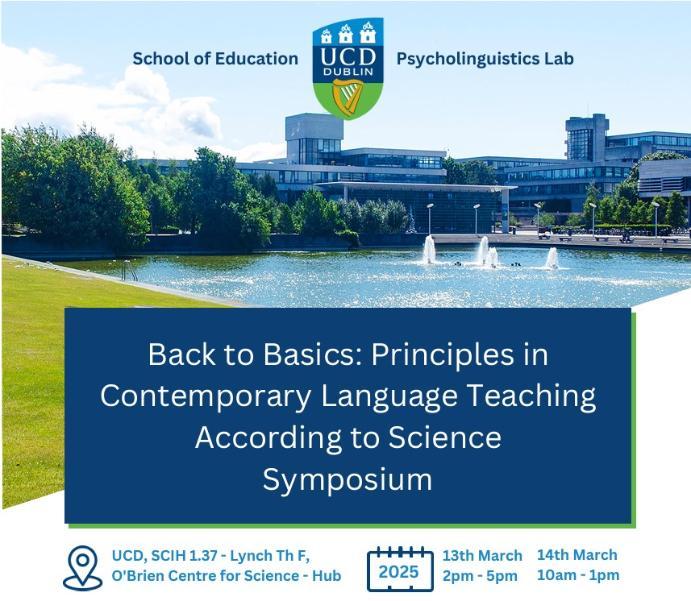Events
Forthcoming Events
Data collection will take place in mid-September 2025 at the UCD School of Education, conducted by Prof. Rastelli and his students. The experiment will investigate the relationship between manual skills, procedural memory, and the acquisition of L2 English syntax by L1 Italian learners. Data collection will involve the use of E-Prime software and a mirror tracing task. UCD students will assist Prof. Rastelli to gain hands-on experience in experimental research. A practical seminar on the use of E-Prime will also be held during this time.
The conference “Second Language in the Brain²: Reloaded” will be held in June 2026 at UCD and will be jointly organized by Prof. Rastelli and Prof. Benati. As a follow-up to the twin conference held in London in 2014, this event is expected to attract hundreds of current and prospective language teachers and scholars interested in exploring how the child, adult, and aging brain copes with language learning and undergoes changes through foreign language acquisition. A one-day symposium will be preceded by a poster session, which will be open to proposals, particularly from young scientists and researchers.
Past Events
Back to Basics: Principles in Contemporary Language Teaching According to Science
13-14 March 2025
UCD, SCIH 1.37 - Lynch Th F, O'Brien Centre for Science - Hub, map (opens in a new window)here

Back to Basics: Principles in Contemporary Language Teaching According to Science Poster
The Communicative Manifesto for Contemporary Language Teaching According to Science Brochure
In this two-day Symposium the main findings from second language research will be considered in order to effectively influence three main areas of contemporary language teaching:
- Vocabulary
- Language tasks
- Focus on form
Workshops on how theory and research translate into language teaching will be offered in the second day of this event.
Invited Speakers
- Prof. Joe Barcroft (Washington University in St. Louis, USA), more details here
- Prof. Michael Leeser (Florida State University, USA), more details here
- Prof. Alessandro Benati (UCD, Dublin, Ireland), more details here
A two-day event with the following plan:
| Day 1, Thursday, 13th March, 2pm - 5pm |
|---|
The main findings from second language research will be considered in order to effectively influence three main areas of language teaching:
- Prof. Joe Barcroft - Vocabulary: Promoting Vocabulary Development in Meaning-Oriented Instruction: From Theory and Research to Practice
- Prof. Michael Leeser - Tasks in Second Language Development: Theory, Research, and Practice
- Prof. Alessandro Benati - Key Principles in Contemporary Language Teaching
(opens in a new window)Join Zoom Meeting
| Day 2, Friday, 14th March, 10am - 1pm |
|---|
Workshops on how theory and research translate into language teaching will be offered.
- Prof. Joe Barcroft – Vocabulary: How to Implement the Input-Based Incremental (IBI) Approach to Vocabulary
- Prof. Michael Leeser - How to Implement Interactive Tasks in L2 Instruction
- Prof. Alessandro Benati - Focusing on Form in Language Instruction: Structured Input Activities
(opens in a new window)Join Zoom Meeting
Registration link (opens in a new window)here.
Talk
5:30-6:30pm, Thursday 3 October 2024, 6:30pm, Complimentary Chinese Dinner
004 Theatre, UCD Confucius Institute for Ireland, map (opens in a new window)here
Reshaping language teaching, policies and teacher education programmes: The role of second language acquisition theory and research
The nature of language, its representation in the mind-brain of humans, and how language is processed and acquired should constitute the backbone of all language and teacher-education programmes. The lack of language experts teaching in these programmes has often led to the perpetuation of misleading beliefs about language and language teaching. For example, the belief that language is a list of rules, such as those found in textbooks and that ‘knowing a language involves knowing its rules’. Perhaps one of the more critical sets of consequences of non-expertise in language and language acquisition involves a lack of understanding about how language develops over time. Some of the myths perpetuated include that teaching grammar explicitly and error correction is necessary or even beneficial, that first-language transfer is the source of all learning problems, and that adults learn languages differently from children, among many, many others. In this talk, the main consequences of the lack of experts and expertise in providing appropriate language teacher training will be discussed and several possible solutions highlighted.
Registration link (opens in a new window)here
Book Launch of SECOND LANGUAGE TEACHER EDUCATION: A Cognitive and Evidence-Based Perspective Poster
Reviews
This latest book from Alessandro Benati is an absolute must-have for anyone
who wants to go into and succeed in the language teaching profession. Through an
impressive coverage, ample engaging study activities and thought-provoking
questions, the book prepares language educators well for the practical challenges in
the classroom and beyond. - Li Wei, Professor of Applied Linguistics, University College London, UK.
Perhaps the best methods textbook I've seen in two decades. In this book Benati does a
wonderful job of reaching multiple audiences, ranging from undergraduate teacher
trainees, to graduate teaching assistants, to students of applied linguists and Second
Language Acquisition. This book will be of enormous value to researchers and
practitioners, alike. - Paul A. Malovrh, Professor of SLA and Hispanic Linguistics, University of South Carolina, USA.
